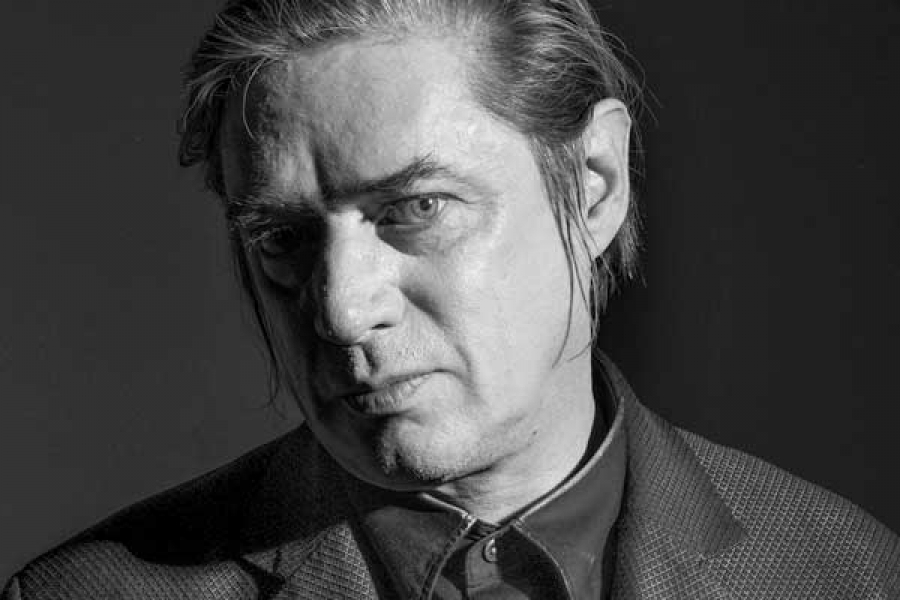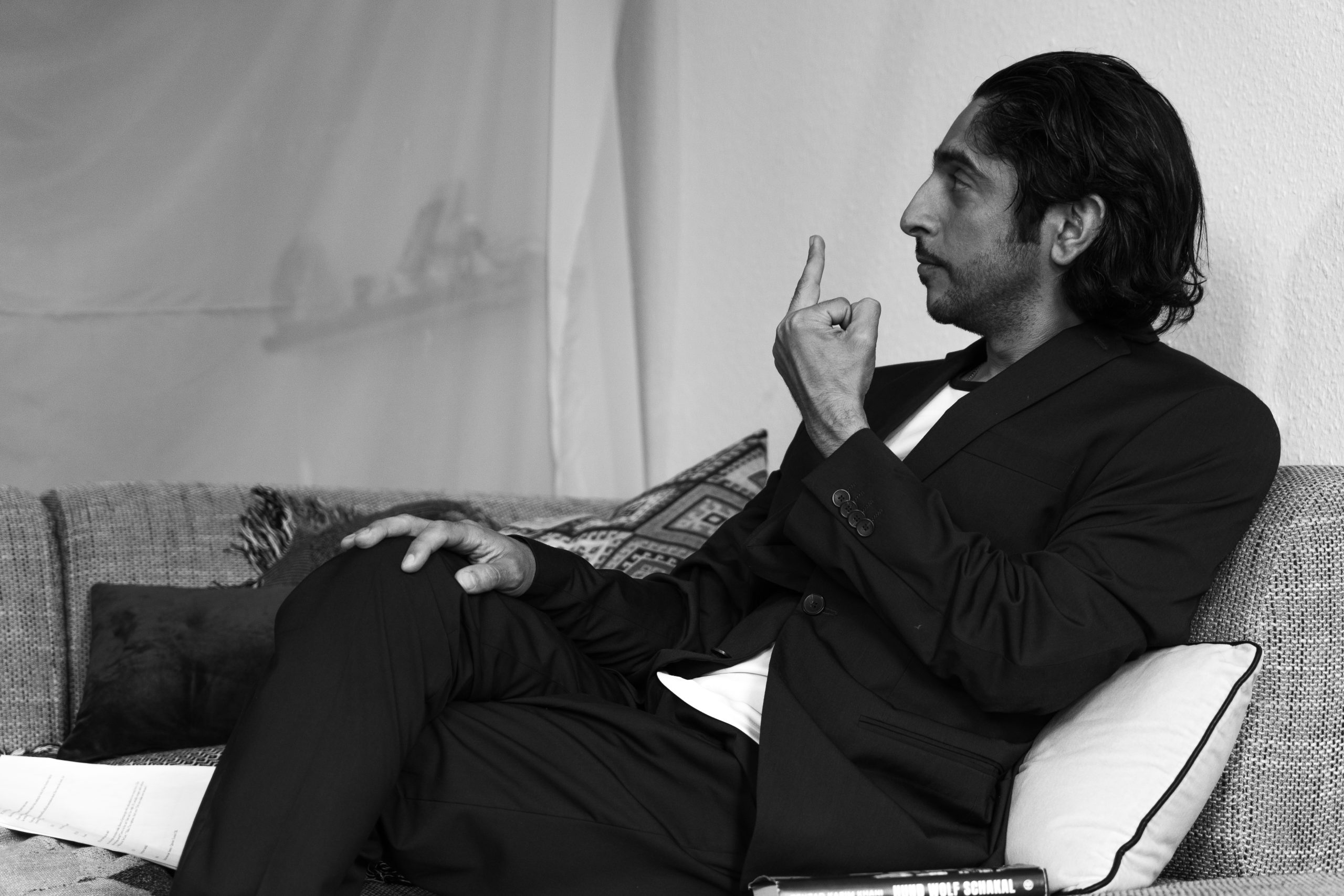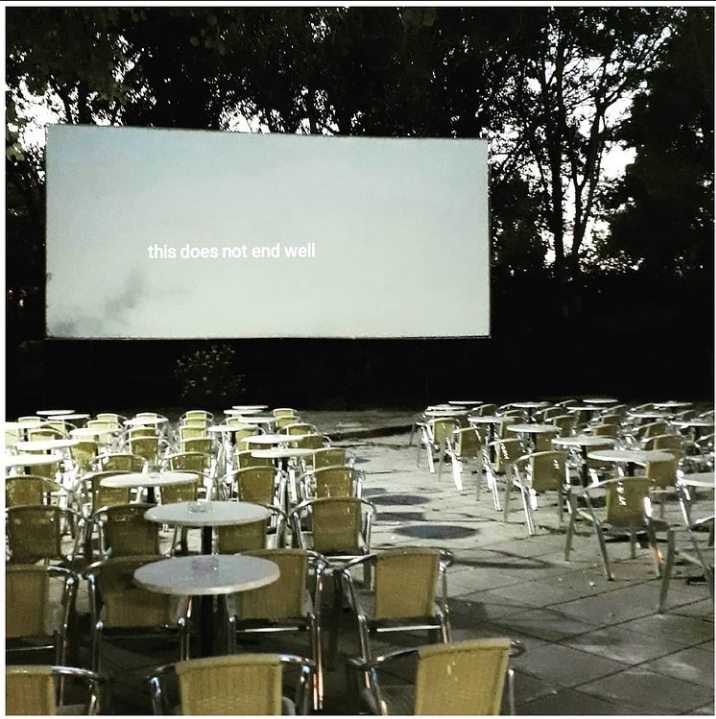“Yeah, I like Billie Eilish. I can see why she is successful and why people are into it.” – Blixa Bargeld.
I did not approach my interview with Einstürzende Neubauten frontman Blixa Bargeld expecting to find common ground when it came to the subject of Billie Eilish, nor that she would even come up. The former Bad Seed guitarist, industrial music (and Patreon) pioneer, and straight-faced straight-talking German didn’t seem like the type who’d go for that kind of thing, but there you go.
Last year, in the midst of a pandemic, Neubauten released their 12th studio album, the brilliant and eerily listenable Alles in Allem (All in All), the band’s first since 2014’s ‘Lament’. Around that time, Blixa and his family left their home in Berlin and upped ‘temporary’ sticks to Portugal, as ‘Corona-refugees’, as he puts it.
In another lengthy exclusive interview for Felten Ink , Blixa discussed his current life in the Algarve, cooking with a live online audience, his innovative methods of creating new material with Neubauten, his long-time relationship with crowdfunding, and his fears about more traditional forms of writing and working in general. The small matter of Blixa’s time with, and indeed departure from Nick Cave and The Bad Seeds was another topic I couldn’t resist but broach.
The current worldly situation with regards to tiresome viruses has obviously been hard on performing artists (no touring etc) but has it had any positives for you, in terms of being able to create new music?
Create music? With what? With the swimming pool?
(This is from a guy who started his career making music with drills and concrete – but my courage to point out, so early in this interview, deserted me)
Yes, but surely you have some means of musical instruments to work with?
I rented a piano. So I have a grand piano standing in the main room and I have my microphone with me for if there’s anything that just requires some vocal work. I do work remotely with my engineer in Berlin. There are technical means, which is complicated, but possible. And I think since I came in August [to Portugal], I think I’ve done three or four recordings for other artists who wanted my vocal services. Some of them require that I actually write, and some of them just want me to read some texts or sing some texts that they supply for various different projects around the world.
One person actually asked me to arrange the pieces of music to record things. But I have to tell them, “Look, I am in the Algarve, I have no instruments here, I have nothing… I can’t do anything like that.”

What about new writing projects… is there an autobiography in the works?
It’s not necessarily new. I had a contract with a German publisher about 10 years ago to write an autobiography and I skipped out of that a couple of years later because I simply didn’t do it. Since I have no real possibility to play music or to have any interaction with other musicians or other artists I decided, okay, what is a solitary activity that I can do? And I write but don’t necessarily write with a focus on one book or one output. I write in parallel, and I’ve been compiling all the lyrics that I have written since the last book of lyrics that I released. I’m compiling all the notes of my times between 1993 and now.
But it’s a pastime. I find the process of writing, as in literal literature, in writing and sitting down, kind of frightening. It’s not really a place that I want to go to. It’s because I know the last time I had writing a book, it took me a long time to get into it, and then once I was in there, I was so involved in it that it wasn’t necessarily much fun to be around me. So, I don’t think it’s necessarily a place I want to go to.
It’s like, ‘I don’t know where this is leading me, I don’t even know what to do with this’. I don’t know if I have much more interest in actually releasing something on an international level than rather just having a German publisher. If you release something in German, it rarely gets translated into other languages, simply, that’s how the literature world is built, it’s very Anglo-Americancentric. So, I’d rather have an international publisher, and see that there is a German edition of it too, rather than having a German publisher that has absolutely no experience in exporting their products. So, I might end up doing the whole thing myself.
I was very surprised to find you on social media and you broadcasting online. I don’t know why – as it does make sense given you’ve been a pioneer in terms of things like crowdfunding, Patreon, etc.
Oh, yeah, I know, but my wife is running all that for me. I have never seen my Facebook page. She’s the one filming me, she’s also the one taking care that it gets out there. She was, you know, an internet pioneer of the first hour. She invented crowdfunding. It wasn’t called crowdfunding back then. We just called it a supporter model, but she did all that. Obviously, she’s good with these things.
Like, when was that, the late 90’s or 2000s – with Napster, when the whole digital world suddenly shook people up from their sleep. At that point, I think in 2001, we did our last record for which we had a recording contract; a classical, old-style recording contract. And after that, no record company, even for an established band, would offer you the same conditions any longer. It was all uncertain and we thought, “Well, how do we do this kind of, like, a supporter model.” You know? You start working and we film, we offer something that the porn industry offered already on the internet, fake intimacy. As for a ‘paid model’, we were all very skeptical about that, but once we had the first 500 people signing up, we realised, “Hey, this is actually working”.
Back then, I think, if you’d say the word ‘streaming’, nobody would know what you were talking about. So, we did web shows and everything and we didn’t do streaming back then. We had USB cables running, so soon you’d end up with a wrong cable running over the courtyard because there was no internet in the backyard where our studio was. And that’s the first thing we did with all this money that came in from the people, we actually bought equipment to build a studio.
We bought a mixing desk from German television and we brought microphones, stands, we bought all these essential things that we didn’t have before because Neubauten was very much a band that never spent any of their money on anything. We built a studio, we made a ton of records and we did Patreon. Patreon was enormously happy that we were working with them because we were the biggest selling musical act on the whole platform. So, obviously what we did back then had and does have a resonance to people nowadays, and people (laughs) in, in this, like, confinement situation, even more so.
Do you think that in, say, 10 years or so time, there’ll almost be a lack of need for a record company or a studio? Everybody now is doing it themselves…
I can very much live without a record company and I could actually very much live without making a record but, I can’t really live without playing. I can’t really live without playing live. I miss that more than being able to go to a studio. But certainly of these three elements: concerts, studio, record company, I can without the last one. Studios, I mean, the way technology has influenced the output of music is obvious. The general format nowadays is a duo that sits in front of two computers, because that’s accessible to everybody. I don’t try to value that, but it’s just accessible and possible to everybody.
You have your music program in that, you work with a computer, you produce electronic music and when you’re finished you send it out and it’s gonna be a record or it’s gonna be on Bandcamp or you actually press CDs or vinyl with it. But that’s not a way that I like to work. For me, it is necessary to work with a band in one room, playing instruments that are mainly acoustic or electroacoustic, even singing automatically makes it necessary to have a room.
Indeed. So no matter what evolves in the future, the need for a group, a band setting, together, will always be a necessity…
I remember when I first worked with Alva Noto who is of course a big, big number in electronics and electronic music. It was almost a shock for him to realise that once you have a singer, you actually need a room, that you actually need to have a microphone, that you have to have a recording studio, and that you can just sit on a headphone with a microphone and sing into a computer. That’s not working for me and for the whole process of composing for me, it is necessary to work with a band. The band is my tool to compose. I don’t come with a fixed thing, I come with ideas and I am unable to sing them to their final stage without the input of other people.
That’s usually in the way we play together, I’d rather feel like I’m directing a play than being responsible for the whole music… I direct something.
Am I right in thinking you don’t put in too much preparation before entering a studio?
Since I bought my first laptop in late ’93, I made it a habit and a duty to write something everyday. This doesn’t necessarily mean that I write lyrics for songs. I write or I collect ideas, I make notes. So, I do come [to the studio] with something and I always have particular things that interested me in that I would like to try out.
And this will have been the case with the latest album, ‘Alles in Allem’?
With ‘Alles in Allem’ – the whole album is very, very dear to my heart. I have, with that album, deeper satisfaction with anything else I’ve done before. And I think that goes for everybody in the band. It just feels really like we’ve done the most uncompromising, beautiful thing that we haven’t done for a very long time.
Tell me about your card system, a way of working with Neubauten?
Yeah, we have this one way that we like to work with which is called Dave. It’s a card system that I devised that is specific to Neubauten, specific to the people in Neubauten and it’s specific to our instruments and strategies. And usually, there are no rules, but we usually play it like everybody’s taking a couple of cards and he keeps them for himself and trying to make sense out of them, you know? Then everybody is building their station, mise en scene so to speak, and then we play and we’re all completely surprised by what everybody else is doing.
There was one particular afternoon that we webcast where we drew the cards and started playing. And it took a very unfortunate direction, the direction was very much into, you know, ‘Music for Airports’ kind of ambiance. And I said, “This is ridiculous, we can’t make a three and a half minute seven-inch single ambient piece!”
That’s just contrary to the whole idea of ambient, you know, a double album, a whole CD. But what do you want? These three and a half minutes of wobbling, nice sounds? It justifies itself in, in a different format, but not in a three and a half for a single. So, I couldn’t sleep. I went home and I was really embarrassed and angry about that. So, the next morning, when I went to the studio, there was only Alex and I said, “Look, uh, I thought about this. We can’t – I, with your permission, I will try something else of that.” And then I sat down and played ‘Alles in Allem’.
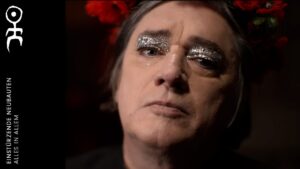
‘Alles in Allem’ was the one song I heard which really stood out for me, quite profound. And I’ve read you saying it took some madness to compete?
Yeah, that took madness to write that (laughs).
So how did you set about getting it to a place where you wanted it to be?
I kept the key. I didn’t wanna go completely rogue, sort of overboard. I thought maybe this can work as an intro. As I said, I wasn’t sleeping, I was kind of, like, hypersensitive and I really came with an idea, and when I recorded, it suddenly, it was necessary for the sound engineer to readjust my headphones. So, I went out into the courtyard, outside of the studio because of my mental state. Pictures were breaking in on me, basically.
I looked at the wall and I looked at the floor and the pictures just threw in and I stood there, writing, and I think I had it within 15 minutes. In that time I had written about 10 verses, just from the floor and the wall and what I’d seen. And then I went back in and just sorted them out and I left in the six best ones and that’s it… that’s why you have in the video also they show the floor, because that’s the lyrics. Yeah, it took a certain amount of madness to actually write that.
One thing I was really interested in about your approach in the studio is the restrictions that you place upon yourself (we’ve touched on the card system approach) – not rules as you say, but parameters to help the process?
If everything is possible, then you don’t get very far… or at least you don’t get very far quickly. I remember a very good example was, ‘Die Befindlichkeit des Landes’, a wonderful song, a great song that we rehearsed before we actually recorded. But in the rehearsal, Alex said, “No sixteenths..”.
I don’t know why he said it, but no sixteenths. You know, whenever you sing, you, now you go, ‘da, da, da, da, no, no sixteenths’. Okay, so we kept the no sixteenths rule, and it’s a rule. But that rule actually got us through and to a point much quicker than if we would have allowed everything to happen that is possible. I don’t think I’m telling any news here, other people have found out that before me.
But I think I have a general rule for anything connected with creativity. It’s that you first make up rules, then you follow these rules, and at some point, you break rules. You make some rules and you’re gonna be quicker. Even if you break them at some point, it doesn’t matter, you’re gonna be quicker.
There’s a funny story that I can tell you from working with Teho [Teardo]. Teho, as a film music composer, he had lunch with Ennio Morricone. And he [Morricone] told him, “You know, you know what the trick is? The chord follows. The cadence basically, doesn’t matter, it doesn’t matter. It’s the arranger. So, you just give a chord following and they arrange it.” And that’s great, I like that. You just make up whatever stupid chord following. If you go, “that, that’s an odd one”, and then you give it to an arranger who has to make sense out of it.
Because a chord following itself is… everybody thinks that’s where the idea is, the idea is not in that. The idea is in what you make out of it. So, if I say, “Look, we write something in C-sharp, it’s gonna go C-sharp, D-sharp, F, F, G, C-sharp,”… anything goes, and then you give that to an arranger, you give it to other people and say, “This is it,” and, uh, then they put their teeth into it and suddenly you find out, “oh, yeah, something can be done with that stupid cadenza I just wrote”.
I’ve heard you say in the past that art has to come from when you have to do something.
No, that’s not me, that’s Arnold Schoenberg who said that. Arnold Schoenberg said it in German. It’s translatable: art doesn’t come from ability, art comes from necessity. You don’t do it because you can, you do it because you have to.
And has there been any period in your life when you went without ‘having to do something’? Perhaps when you felt you couldn’t or maybe it wasn’t right?
Oh, yeah, I did not do a record since, well, since we did ‘Lament’ in 2014. Of course, the rest of the band kept asking me if we should continue working and do something else, and I didn’t feel like it. At the time I didn’t know if I had another record in me, I didn’t know if I wanted to do another record. In all the time we were playing, we were playing greatest hits, we were playing ‘Lament’, we were playing shows, but I didn’t feel like it. So that, it came to me one morning, in jet lag, coming back from Hong Kong and being in Berlin in bed and I just realised, I have to make another record, and I started making another record. Every now and then, I feel very much that I don’t have to do anything.
Did you feel the need for a break as such?
I don’t call it taking a break. I can’t really work if I don’t have the feeling that I have to. And not because of money, no. If I have to, it’s because there’s something that I need to do.
Back to the latest record. I love ‘Ten Grand Goldie’, the video’s very funny. Your daughter makes a great cameo…
Oh, in the video? Yeah, that’s my daughter.
Does she have any opinion on your music or give you feedback?
Yes, there are some things that she likes better than other things. She loves ‘Nargony Karabach’ and there are some other things that she likes, but she is like everybody that age, more into Billie Eilish than she is Neubauten.
I like Billie Eilish…
Yeah, I like Billie Eilish too. I can see why she is successful and why people are into it. And it’s extremely well made and extremely well produced.
My wife has been playing the last Taylor Swift album nonstop to the point where I think I know most of the lyrics and it’s driving me absolutely crazy.
Oh, my daughter can sing them all too. That’s fine. I would prefer her if she would do that, but unfortunately, she sings also a lot of really stupid songs that are really annoying. I remember that I asked my daughter, five or six years ago, on one particular song that I was writing for Teho, I asked her, “So, what should I do?” And she said, “A tiger is approaching.”
Well put. You’ve said, and it seems, that on the latest album you dropped your defenses a little bit, ‘becoming non-hermetic?
Well, yeah, it’s a bit of a strategy in writing, and in terms of the, ‘to rather be cryptic and hermetic’, I just kind of realised that I’m untouchable anyway, so… I am in a position where it really doesn’t matter anymore.
Does that come with age or just experience?
It comes with age, with age and resonance. People in my profession, a lot of 62-year-old working musicians would rather behave like they’re 30.
I’m also keen to know more about ‘Google Monster’.
Oh, in the first lockdown, I did a lot of private shows for the supporters and to one of them, I explained my technique called ‘Google monster’ which is basically Google-supported writing. So, I would write, in that case, what I explained is, that I describe a creature, head to toe, with very generic, open sentences. And then I Google using these, um, roots. And, and outcome like, four, five solutions and then I end up with… five different monsters that from head to two are very well described. But that would be just making Google monsters.
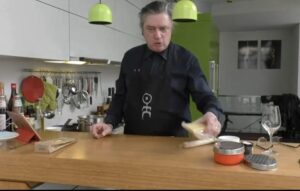
Werner Herzog once said that he was convinced that cooking is the only alternative to filmmaking. Do you agree? I love the fact that you’re a long-time active chef and actually do ‘shows’ for your website subscribers?
Erm, no. I think I came up with the idea of a synchronised cook, because that’s the difference to a normal cooking show. In 2002, we had one event for the supporters where we cooked together, the band and all the supporters. We made a recipe from The River Café in London which is a vegetarian pasta with tomato ginger sauce, which contains enormous amounts of ginger. But really delicious, really good. Neubauten have all worked in the kitchen and some of the supporters did the same thing and then we ate like Leonardo da Vinci’s Last Supper style on a long thing with the cameras in front of us so that they can eat with us.
I cook something in real-time including the cutting and the whole preparation, and whoever wants to do it with me can do it with me. And, yeah, some people do. So, then I make a caldo verde, the basic national dish of Portugal, basically kale and potato soup. I do it in real-time and in the end, we can eat the soup together. And then of course the other element is whatever else I talk about, because I have the iPad in front of me, I see the comments, I see the questions and I play music at the same time.
I’ll try and join next time.
Yeah, well, you have to join my website. It’s cheap, it’s only 10 euros, so (laughs).
I am a fully paid-up member now!
Do you have any beliefs in vegetarianism, a diet that you seem to still follow but gave up when living in China?
I’m mostly vegetarian, yep. But I eat fish. But, no, people would ask, “Why are you vegetarian?” and I’d reply “Because I hate animals.” But I had no ethical background in that. I basically became vegetarian because I didn’t want to eat with my parents anymore. But it’s not that easy to go back. When I was living in China I started eating meat again because I didn’t want to deprive my wife of all the wonders of Chinese cooking. Chinese don’t eat in a way that you say, ‘okay, I order this and you order that’. You order for the whole table and then you all eat together. So, surprisingly, especially living in Beijing, it was surprisingly difficult sometimes getting things that are really vegetarian, things that are made without soup stock or made without ham, or things like that. So, well, I ate Chinese while I was in China but my body didn’t like it. So, I scrapped it again. I had developed some kind of nephritis that was gone once I stopped eating meat again.
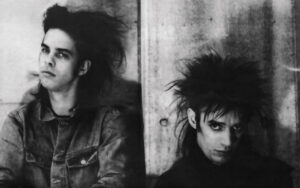
The last time I saw you on film was a documentary, you were sitting in a car with Nick Cave. Did you like the result of 20,000 Days On Earth?
I never saw that film. There are about, like, three films that I appear in every year and I never watch them.
I’m a huge admirer of Nick Cave and The Bad Seeds, and came to know you through your time in that band. How do you look back on the experience in the group?
Oh, it’s a very long ago part of my life, but the strange thing is that since I came here, I systematically went through all my daily notes – 68 volumes of notes. And I played with Nick Cave for 20 or so years and knew him before but I played with him for 20 years and so The Bad Seeds appears surprisingly little in all these notes. It almost seems to me like I was still leading a parallel life, one when I was playing with The Bad Seeds and the other one. But it was a big part of my life, that’s for sure. I’m sure it has left its scars and its traces.
And you leaving the band was unfortunate, but I suppose you had your reasons?
When I joined The Bad Seeds, I was 23 and I left the year after I got married. I had no personal difficulties with anyone in the band and artistically, I would say it was becoming more and more important to me. But I had the very clear feeling that I would be unable to balance The Bad Seeds and Einstürzende Neubauten and my marriage. There are a lot of rock star wives, they’re always the unnecessary fifth wheel in the band bus. I was in London recording ‘Nocturama’ and my wife was in an apartment that we rented in London, but she had nothing to do and I knew that I wouldn’t be able to balance two tours, and records a year, together with my marriage.
I was very, very unhappy with the management. After the death of that so-called manager, everybody realised that he was ripping us off, for years. Now, I can say so. But, you know, back then, I didn’t give any, explanation, I just said, “I can’t balance these things…” which is true, the management thing was very, very unsatisfactory. In the end, they found money everywhere hidden in his office, in plastic bags, so I was not paranoid, he was ripping us off.
Do you still keep in touch with Nick or anyone else in the band (living, obviously)?
Nick contacts me. Well, I’m meant to get a parcel today of records from Australia which I’m meant to sign and then they’re gonna get picked up by DHL again, they’re gonna be auctioned for supporting The Bad Seeds crew. But, I am still… we didn’t leave on bad terms. I didn’t leave on bad terms, it’s all fine. I still think it was the right decision for me because.. it would have been really bad for my marriage mainly. And giving up Neubauten was not an option for me.
Blixa Bargeld, thank you.
Interview by Henry Jackson.
If you want to join Blixa’s official ‘cook’, you can sign up via his website
